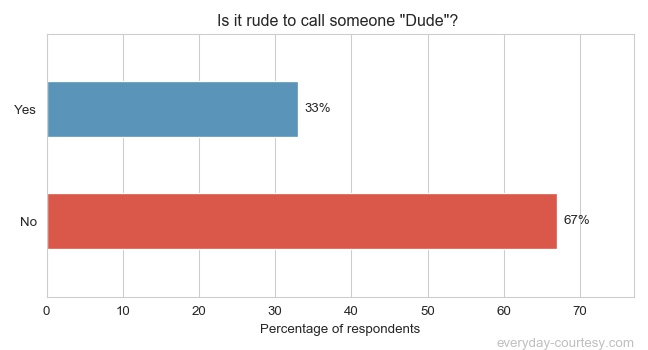Is it rude to call someone dude? We asked 105 people in the US and about a third of the respondents found the term dude to be rude.
The culture someone is from, the relationship you have with them, and other variables can influence how they feel about it. Calling someone dude may be a good idea with your friends and family, but not something to do at work.

Try to keep it more professional there and find acceptable ways to address each other that work well in a business setting.
If you cringe when someone calls you dude, let them know. You can do so in a polite manner.
If it is someone you pass on the street asking for information, let it go. You aren’t going to form an ongoing relationship with them, so it doesn’t matter. If it is someone you want to get to know better, politely let them know it isn’t a term you are content to be called.
Be mindful when you use it and the reaction you get from someone. If they aren’t fond of it, make a conscious effort not to use it.
If you often call people dude, it may be a habit that is harder to break than you thought. Do your best because there is a number of people based on the recent survey that think it is rude. You don’t want them to think you disrespect them or you are hard to get along with!
The Survey
To find out what people think about the term dude we asked 105 people in the US for their opinion. The survey panel tended to be younger – heavily weighted in the 25-35 range.

As you can see, 33% of respondents think it’s rude to call someone dude. Therefore, it is important to think about whether you are talking to someone who belongs to this third and in this case to refrain from using the term dude.
Location and Culture
In various locations and cultures, calling someone dude isn’t considered rude at all. In fact, it is a term commonly used.
For example, in California people spend plenty of time outdoors enjoying the beaches and the sunlight. The warm temperatures make it a place to enjoy all year long. Surfing tends to bring plenty of tourists and enthusiasts to the area, and calling each other dude is very common.
If you live in such a location where the culture is accepting of calling someone dude, you may be inclined to roll with it. Perhaps you are visiting for a short vacation or you are there to get away from a colder winter climate.
What to Say:
“Dude, do you know what time the bus comes to this stop?”
“Hey there dude, are there any hidden gems to explore around this area most tourists overlook?”
“Wow, you are really good at surfing dude!”
“Where can a dude like me find some lessons for surfing around here?”
“Dude, what do you want to do today? There is plenty to see and do around here!”
Casual Talk
The term dude often finds its way into casual talk. Common conversations to break the ice or to interact with someone new can be a time to use it. Of course, it all depends on where you are at and the setting.
You may feel more comfortable saying it to someone your own age versus someone older than you because of the respect expectations.
What to Say:
“Yo Dude, I really like your sunglasses. Do you mind me asking where you got them from?”
“Hey there dude. How are you doing today?“
“Dude, do you know where we turn in these forms? I haven’t done this before.”
“Thanks dude, for holding the elevator for me. I appreciate it.”
“Dude, I can’t believe how cold it is today! Yesterday was such a beautiful day, what a change!”
Friends and Family
Being relaxed with friends and family is important. You should be able to talk to them in a relaxed manner. They should know you well enough to be fine when you use the term dude.
Some will take offense to it and they will tell you. When you know your circle though, you will already have an idea of who you can say it around and who you can’t.
Spending time with cousins is common for any family. They are often your first friends from an early age. Calling them dude can be a term of endearment among you. The same with your siblings.
Typically, it isn’t something you would say to your grandparents and such, but you know those lines with friends and family. They are familiar with your lingo and you know where you can freely use the term dude.
What to Say:
“Dude, what is for dinner? I am starving!”
“What movie do you want to watch tonight dude? There is a new comedy and a scary movie out that have good reviews.”
“Are you free Friday night dude? Want to hang out after work?”
“Who are you rooting for with the big game dude? Want to watch it at our house?”
“Family gatherings are so much fun! I love the stories and hanging out with all the dudes I grew up with!”
Work Environment
In most cultures, there is no room for the term dude in a work environment. It will be considered rude to use such a term.
You won’t be taken seriously by your co-workers or your supervisors. The use of such a term can be frowned upon in-house. They definitely won’t accept calling any customers or associates’ dude. It is too great of a risk someone will be offended and the business doesn’t want any negative comments circulating about it.
Your level of formality within a work environment depends on where you work and what you do. Pay attention to such dynamics when you start a new job. This will ensure you don’t overlook such protocols and etiquette accidentally.
It may be deemed find to call each other by first names, including supervisors. You may need to stick to titles such as Mr., Miss, and Mrs. within your work environment. There are other terms you can use instead of dude so it shouldn’t be a stretch to keep it out of work conversations and correspondence.
What to Say:
“Sir, do you have time to discuss a few ideas I have to improve our department?”
“Miss, please let me know if there is anything you need assistance with.”
“Jill thank you for staying late and helping me get the presentation ready for tomorrow.”
“There is a gentleman waiting for you in the lobby with a pressing issue. Do you have time to talk to them?”
“Mr. Jones, would you mind trading shifts with me on Friday so I can go to a doctor’s appointment?”

Matt Vargas is an author and public speaking coach with a degree in sociology and more than ten years of practical experience. Matt is responsible for the empirical surveys at everyday-courtesy.com, is a passionate recreational musician, and blogs here about his experiences in the field of interpersonal communication.

